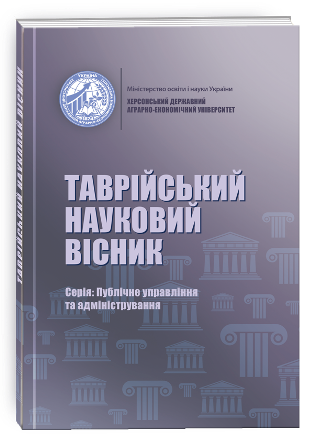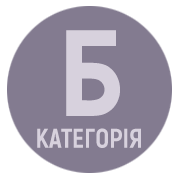PUBLIC ADMINISTRATIVE ASPECT OF THE POST-WAR RECONSTRUCTION AND REFORM OF THE HIGHER EDUCATION SYSTEM OF UKRAINE
DOI:
https://doi.org/10.32851/tnv-pub.2022.4.7Keywords:
public administration, innovative management, decentralization, higher education system, reform.Abstract
The article deals with specific issues of the post-war reconstruction and reform of the higher education system of Ukraine. Reforming the higher education system of Ukraine is an objective and necessary process, which leads to significant changes in the approaches of public administration, which are strengthened in the conditions of strengthening the principles of democracy, the cohesion of Ukrainian society, and social unity. The main directions of reform remain the processes of the formation of the market for educational services and a competitive environment in education, a high level of liberalization of management mechanisms, and publicprivate partnerships. During the research, such scientific methods as analytical, dialectical, structural-functional analogy and synthesis, comparative analysis, and modeling were used. Within the scope of the research, the current state of management of the higher education system in Ukraine was considered, and the need for the introduction of innovative management models and their practical development was determined. The author proposed a conceptual model of the reform of the higher education system of Ukraine in the conditions of post-war recovery, for which the principle content and structural elements are defined. Neoliberal processes and their consequences in the field of educational policy and «new public management» on the state education management system are analyzed. According to the new public governance approach, human resources are viewed from the perspective of human capital (i.e. as a potential form of productivity). In this way, «market values» are accepted, integrated, and subjectivized. A new form of rationality, which perceives the management of education through indirect forms of control, sees economic market values as a way to improve productivity. The management of education in the context of post-war reconstruction must change traditional political structures and processes, making room for new agents, in particular stakeholders who intervene in public policy. The concept of «decentralized governance» begins with an analysis of the behavior patterns of subjects and how they interpret the facts of everyday life, rather than with an analysis of external structures or causes. Subjects govern themselves without needing a strong external government to control them. In this context, educational management is perceived as a management technique and technology that affects the daily practice and management of the higher education system. Thus, the dynamics, functions, responsibilities, priorities, and practices are rethought in terms of choice, competence, provision, and «success», which are related to performance indicators and standardization of results within the higher education system of Ukraine.
References
Verger A., Curran M. New Public Management as Global Education Policy: Its Adoption and Re-Contextualisation in a Southern European Setting. Critical Studies in Education. 2014. № 55. P. 253–271. https://doi.org/10.1080/17508487.2014.913531
Wilkins A., Olmedo A. Education governance and social theory: Interdisciplinary approaches to research. London, 2018. 256 p.
Leys C. Market-Driven Politics: Neoliberal Democracy and the Public Interest. London, 2003. 280 p.
Ritacco-Real M., Garrote-Rojas D., Jiménez-Ríos FJ, Rodríguez-Martínez FM. Analysis of the Educational Administration of the Public Educational Centers of Andalusia (Spain): The Role of the Manager in the Face of New Social Challenges. Education Sciences. 2022. № 12(6). P. 422–430. https://doi.org/10.3390/educsci12060422
Piattoeva N. Elastic numbers: national examinations data as a technology of government, Journal of Education Policy. 2015. № 30 (3). P. 316–334. https://doi.org/10.1080/02680939.2014.937830
Sant E. Democratic Education: A Theoretical Review (2006–2017). Democratic Education: A Theoretical Review. 2019. № 89 (5). P. 655–696. https://doi.org/10.3102/0034654319862493
Лукашук М.А. Теоретико-методологічні засади дослідження інноваційних процесів в системі освіти. Гуманітарний вісник ЗДІА. 2018. № 72. С. 146–154.
Соколова Е. Т. Теоретико-методологічні засади дослідження інноваційних управлінських форм у системі вищої освіти України. Modern Economics. 2021. № 29 (2021). С. 176–181. DOI: https://doi.org/10.31521/modecon.V29(2021)-27
Сиченко В. В., Рибкіна С. О., Соколова Е. Т. Сучасні тенденції розвитку організаційних структур у системі управління закладами вищої освіти. Публічне управління та митне адміністрування. 2020. № 4 (27). С. 63–68.
Соколова Е., Братаніч Б. Сучасні тенденції та зарубіжний досвід фінансування закладів вищої освіти. Збірник наукових праць ΛΌГOΣ. Вип. 1. С. 48–50. https://doi.org/10.36074/24.01.2020.v1.1







